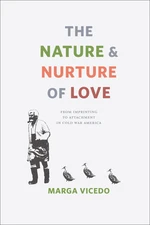The notion that maternal care and love will determine a childâs emotional well-being and future personality has become ubiquitous. In countless stories and movies we find that the problems of the protagonistsâanything from the fear of romantic commitment to serial killingâstem from their troubled relationships with their mothers during childhood. How did we come to hold these views about the determinant power of mother love over an individualâs emotional development? And what does this vision of mother love entail for children and mothers? In The Nature and Nurture of Love, Marga Vicedo examines scientific views about childrenâs emotional needs and mother love from World War II until the 1970s, paying particular attention to John Bowlbyâs ethological theory of attachment behavior. Vicedo tracks the development of Bowlbyâs work as well as the interdisciplinary research that he used to support his theory, including Konrad Lorenzâs studies of imprinting in geese, Harry Harlowâs experiments with monkeys, and Mary Ainsworthâs observations of children and mothers in Uganda and the United States. Vicedoâs historical analysis reveals that important psychoanalysts and animal researchers opposed the project of turning emotions into biological instincts. Despite those substantial criticisms, she argues that attachment theory was paramount in turning mother love into a biological need. This shift introduced a new justification for the prescriptive role of biology in human affairs and had profoundâand negativeâconsequences for mothers and for the valuation of mother love.
Price history
▲18.79%
Jan 29, 2023
€27.46
▲574.94%
Jan 28, 2023
€23.12
▼-87.53%
Jan 21, 2023
€3.43
▲20.4%
Jan 8, 2023
€27.46
▲565.91%
Jan 7, 2023
€22.81
▼-84.72%
Dec 31, 2022
€3.43
▼-18.38%
Dec 30, 2022
€22.42
Dec 24, 2022
€27.46

